Cork is on the verge of hosting a sports world cup.
At the opening ceremony on Sunday, June 5 in Musgrave Park, there’ll be hundreds of athletes and coaching staff from 28 teams drawn from as far away as Argentina and as near as Ballincollig; there’ll be proud and excited family members and supporters; there’ll be the sound of trumpets and tubas from the Army Band and trad tunes from Altan; the Taoiseach Micheál Martin who grew up down the road from Musgrave Park will be there along with the usual mix of local politicians and men in suits wearing shiny status chains; there’ll be minor and major celebrities, influencers, and well-known rugby players; there’ll be the organising staff from the international mixed ability rugby tournament, from Cork and abroad, and moving between the pitch and the podium there’ll be Alan Craughwell, a Galway native and father of three who plays with Sunday’s Well Rebels mixed ability rugby team and is the director of the tournament in Cork.
There’s a good chance if you’ve heard about the International Mixed Ability Rugby Tournament (IMART) that’s fast approaching, it’s because of Alan. For the last few years he’s been up and down the country, and further afield, preparing the ground for Cork to host the event, but also to help people understand what mixed ability rugby is. And that’s probably the best place to start.
Mixed ability rugby is, as the name suggests, the game of rugby but it’s played by a team of players that is far more representative of the actual communities we live in. The ethos of mixed ability rugby, indeed all mixed ability sports, is premised on diversity, inclusion and equality.
As Alan acknowledges they’re some of the buzziest buzz words about, and often how we use them feels contrived, confused or tokenistic (like adding pronouns to your email signature).
“But I suppose this is where we're trying to break down that barrier in terms of the language we use round [these terms] and the perceptions of people with disabilities or barriers from people, just ordinary members, say within a club, or just just regular people,” Alan says.
“There's no need to fear people and no need to put labels on people which is sort of one of the things I would bring it back to. We all get given a name, and we don't necessarily get given a label, we end up getting it.”
On paper there’s very little that separates the game of rugby that the Munster Rugby team plays and any of the teams that will be contesting the tournament in Cork next week. The mixed ability games are a bit shorter, the scrum is uncontested (the ball is put in and rolls out), but other than that it’s the same game: physical, skilful, brutal, tactical, and exhilarating all over the course of the game.
Except it’s not at all like a Munster game when you consider the members of each team. One’s elite all the way, and the other is premised on the idea that every man and every woman who wants to play sports should be given that opportunity. Essentially, what mixed ability sports boils down to is opportunity.
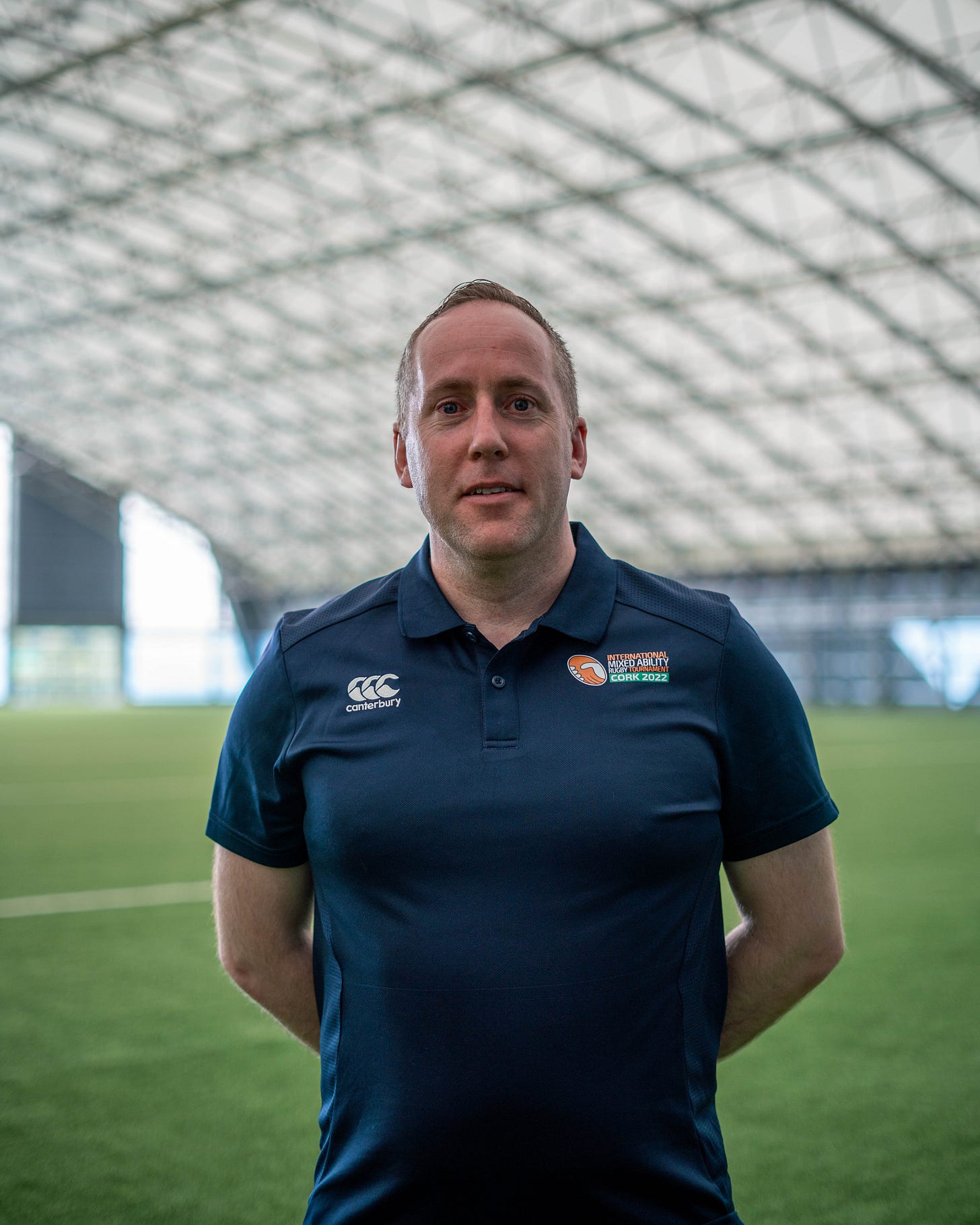
It takes a club
A few weeks back I went to along to see a handful of mixed ability rugby teams from across Ireland convene at the Irish Rugby Federation Union’s High Performance Centre in Dublin for a warm-up mini-tournament. It was a cracker of a day on the pristine pitches in Blanchardstown and it was also my first time ever to see mixed ability rugby being played. Teams had travelled in from Banbridge in County Down, and Bantry in West Cork and they were getting togged off and going through their warm-ups in the same venue that Johnny Sexton et al train on.
Alan was there both as organiser and to line out for Sunday’s Well Rebels who he has been playing with since they were founded in 2014. The team is comprised of players with intellectual disabilities, players with Down syndrome and players who’ve been throwing a rugby ball around nearly their whole lives.
Alan was a rugby novice when he helped set up the Rebels; his broad rounded shoulders were built up over years of swimming, especially long distance swimming. Becoming a rugby player and helping start the Sunday’s Well mixed ability team was entirely accidental. He doesn’t say it, but it’s this outsider perspective which likely gives him a different vision for how rugby can also be played.
A few years back he was in the waiting room at his physiotherapist and he stumbled across an article in World Rugby magazine about mixed ability sports.
“I was working in the area of intellectual disabilities and managed a day service centre here in Cork and just it just rang home to me that there was no activity or opportunity for guys to really engage in their own community clubs,” Alan says.
That article and the idea that sports above all else can be a place for community lit a fuse in him and he went down a research rabbit hole, off his own back, and started making connections, especially in England. One of his first trips to England to learn more about mixed ability rugby was funded by the English Rugby Football Union.
Although Alan had no rugby connections, through a friend in Sunday’s Well the idea of a mixed ability team was floated and it took root with 13 players turning up to the first night’s training back in 2014. Since then more than 50 players have come through the team and the Rebels won the inaugural mixed ability world cup in Bradford in 2014. The Rebels are a team that are truly reflective of the spirit of mixed ability.
That’s also a very condensed history of the Rebels, but it took a lot of patience and pushing and adjusting to build the team and train the players, some of whom suffer from post traumatic stress disorder, or have a brain injury or have intellectual disabilities such as Asperger’s Syndrome.
Lorcan Kelleher, one of the original Rebels, has a diagnosis of autism. As Alan told World Rugby magazine back in 2020, when someone passed Lorcan the ball, it would bounce off him.
“I remember saying to his dad, ‘Is he enjoying it?’ Lorcan wouldn’t talk too much, he struggled even saying hello,” Alan said.
“He went from looking on the ground to holding his head high. And being able to say hello and talk to people. His dad would tell us that he’d have his bag packed a couple of days in advance before training. That’s how much he likes it.”
Sunday’s Well has brought together family members on the same team as well as players who would, for all intents and purposes, never cross paths in life. We might all live in the same community, but the truth is we live for the most part in separate communities. Clubs such as Sunday’s Well Rebels, West Cork Jesters and the Ballincollig Trailblazers remove those invisible but often implementable walls.
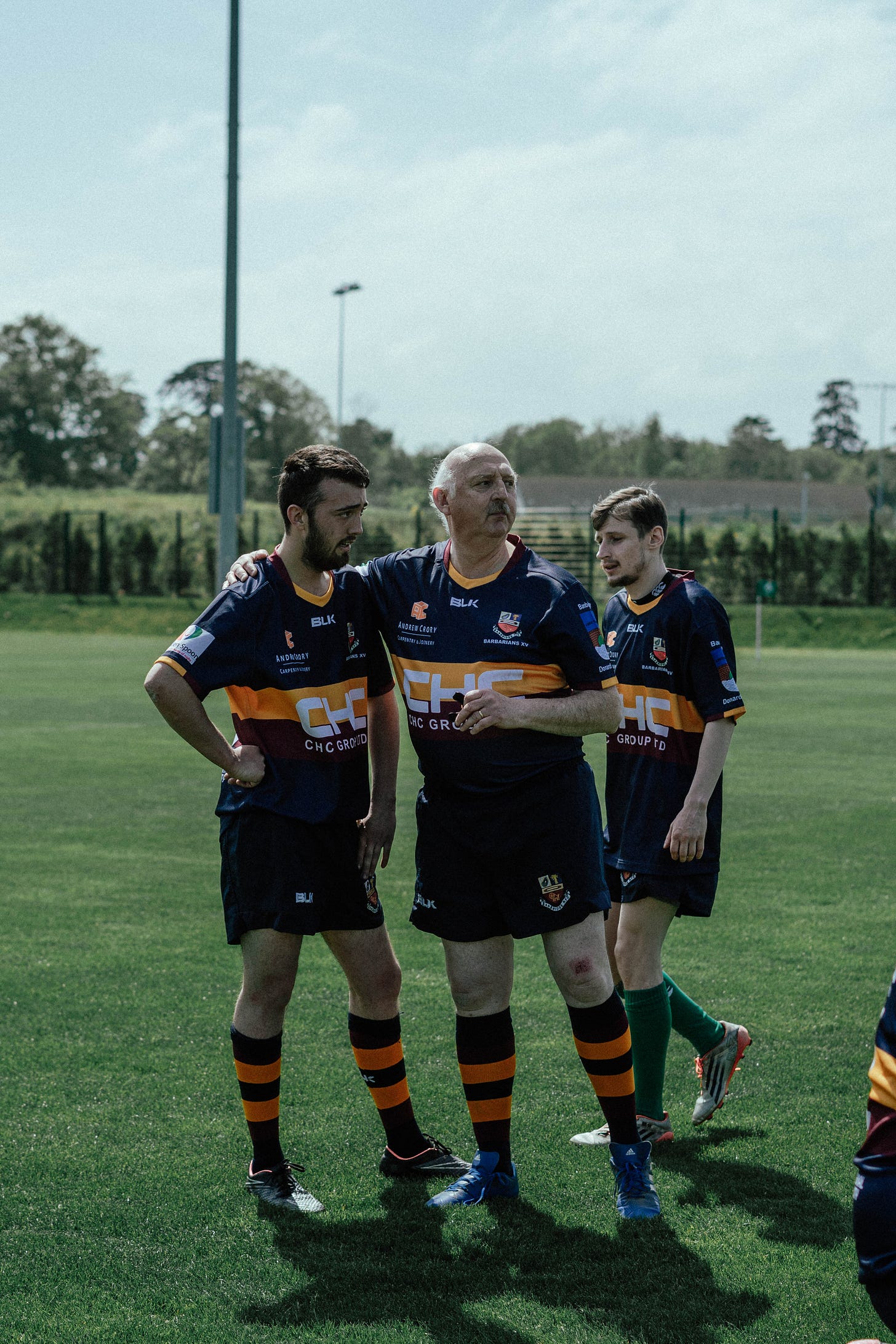
Challenges
One of the first challenges that Alan and the tournament organisers were presented with was a global pandemic. The tournament in Cork was originally scheduled for 2020, and they had a hugely successful launch night in City Hall in February of that year - it was all full steam ahead, until it wasn’t. Alan recalls being en route to Armagh for a committee meeting with the IRFU, where the IMART team in Cork were going to present, but even as they went up they were wondering if they should go at all. The Ireland vs Italy Six Nations game for the start of March had just been pulled because of Covid-19. As with all sporting events in 2020, the mixed ability world cup was canned for 2020.
On the IMART homepage today you’ll see quite visibly that the IRFU supports the mixed ability world cup, but it was a tenuous relationship starting out Alan says.
As he explains big sporting organisations are conservative by nature, and they move cautiously, especially into new territory.
“It was so new the concept,” Alan says of explaining mixed ability to the rugby federation. “It was kind of an alien, and they’re thinking, ‘why would you put people who are vulnerable with disabilities into a full contact game?”
Alan has sympathy and more importantly empathy for this viewpoint, but he was willing to bat for people who can’t work their into boardrooms and committee meetings and outline why they should be given the same chances as others. Moreover, he’s fully aware of all the opportunities that are not afforded to people with disabilities, for instance joining a sports team.
It took a bit of convincing, coaching and a pilot project but the IRFU are fully on board. Like many big organisations the IRFU has a diversity and inclusion officer, and that officer, David McKay, will be in Cork, not just as an official but also to line out as a player for the Malone Tornadoes from Belfast.
Equally though Alan likes to spread the challenges around. There’s a wide mix of abilities and experience on each team, but they don’t treat the game or the players with kid’s gloves.
“Just because somebody has a disability doesn't mean they can't do stuff and they can't be challenged. And you know, winning and losing, they’re also part of sport and part of life and people have to deal with these things, and we all have to deal with these elements.”
And I think that that really leads into this other overused word at the moment -resilience. And that resilience really doesn't just happen overnight, or it doesn't happen just because of a pandemic, it happens over a lifetime. So you just have to keep working, and keep making mistakes, but keep trying.”
Cork, and afterwards
Cork will be a testing ground in many ways for mixed ability sports in Ireland . It’s only the third iteration of the mixed ability rugby world cup and there’s pent up excitement to get on the ground in Musgrave Park given the long delay. This year’s tournament will be the first time women’s teams compete in the mixed ability rugby world cup with four teams drawn from Cork, Spain, Italy and Ecuador as well as participating players from England, Belgium, the Netherlands and Canada.
The week of the tournament will also be a huge chance to promote all aspects of the mixed ability ethos: there’s a mixed ability rowing regatta, which ties in nicely with the Cork Harbour Festival which kicks off the same weekend. And at UCC, a day long conference supported by the EU and UNESCO will examine the potential of the mixed ability paradigm in sport and in society.
As with all big tournaments, Alan, when he gets the time, is thinking about the bigger picture - the legacy and impact of holding the first ever mixed ability world cup in Cork. It’s going to be a crazy, exciting, tear and laughter filled week, but when the tournament leaves town Alan wants to capitalise on the exposure and the potential that mixed ability sports have to transform lives and communities.
Last year Alan set up Mixed Ability Sports Ireland, a non-profit company, and it’s remit is to promote mixed ability activity and inclusion within sport across the island of Ireland. The IMART tournament wouldn’t have been possible without the funding and backing from the European Union and the European Commission, but also many local and national companies. But when the curtain comes down on the week-long rugby spectacle, Alan wants to be able to bring the show on the road and get the idea out to communities across Ireland that a mixed ability team is possible in every sport from karate to camogie. It might take a bit of courage and convincing, but in a few short years Cork (and indeed Ireland) has gone from having just one mixed ability rugby team to hosting a world cup.
Alan also thinks the world cup is a huge chance for Cork to prove itself and show that it can and should be holding big international sporting events.
“Something like this isn't possible without a considerable amount of funding because we want to put on a world class event and prove that sporting events can exist outside of Dublin and outside of major sporting hubs and that like you know Cork should become a sporting hub and we should be able to attract events like this. We do need to get a bit more behind stuff like this at a Cork level,” Alan thinks.
Beginning Sunday, Musgrave Park will be a field of dreams and hopes and wins and losses, but more than that though it will be a place where new friendships and memories are formed.
In Dublin, at the IRFU’s High Performance Centre I chatted with players from Tyrone, Ballincollig, Dublin and West Cork and to a person nearly all of them had the same sentiments about the upcoming tournament in Cork. Yes, they were excited about the competitive element, but above all though it was the sense of excitement and community that comes with a huge sporting event that brings players from all over the world and puts them in the same place - whether it’s on the field at Musgrave Park, or at the athlete’s village at UCC, or the buses to and from the stadium, or even the hijinks in town when the games have receded. It’s going to be an event that players will remember for the rest of their lives.
On the drive down from Dublin Alan shares a few of those stories and anecdotes from his trips away with the Rebels to Bradford, where they won the first world cup, to Belgium and to Rome. However, it’s “Vegas rules” so I’m prevented from recounting what happens on tour, but suffice to say those trips put groups of men and women together who were it not for a team built around mixing abilities would not exist. If sport is anything, it’s above all this, the chance to get on to a pitch, or a court, or a boat and for 20 minutes or however long it lasts, be part of something that’s communal and beautiful.
At Musgrave Park all next week you’ll get to witness history being made, and on and off the pitch friendships being formed.
For more information about the IMART World Cup and how to book your free tickets for the games and the opening ceremony, visit the official website here.

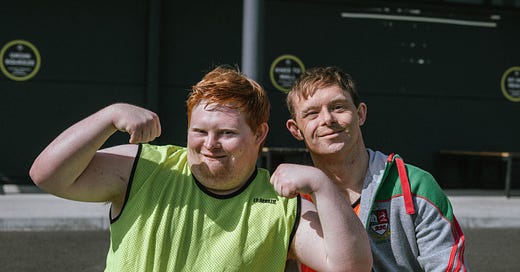


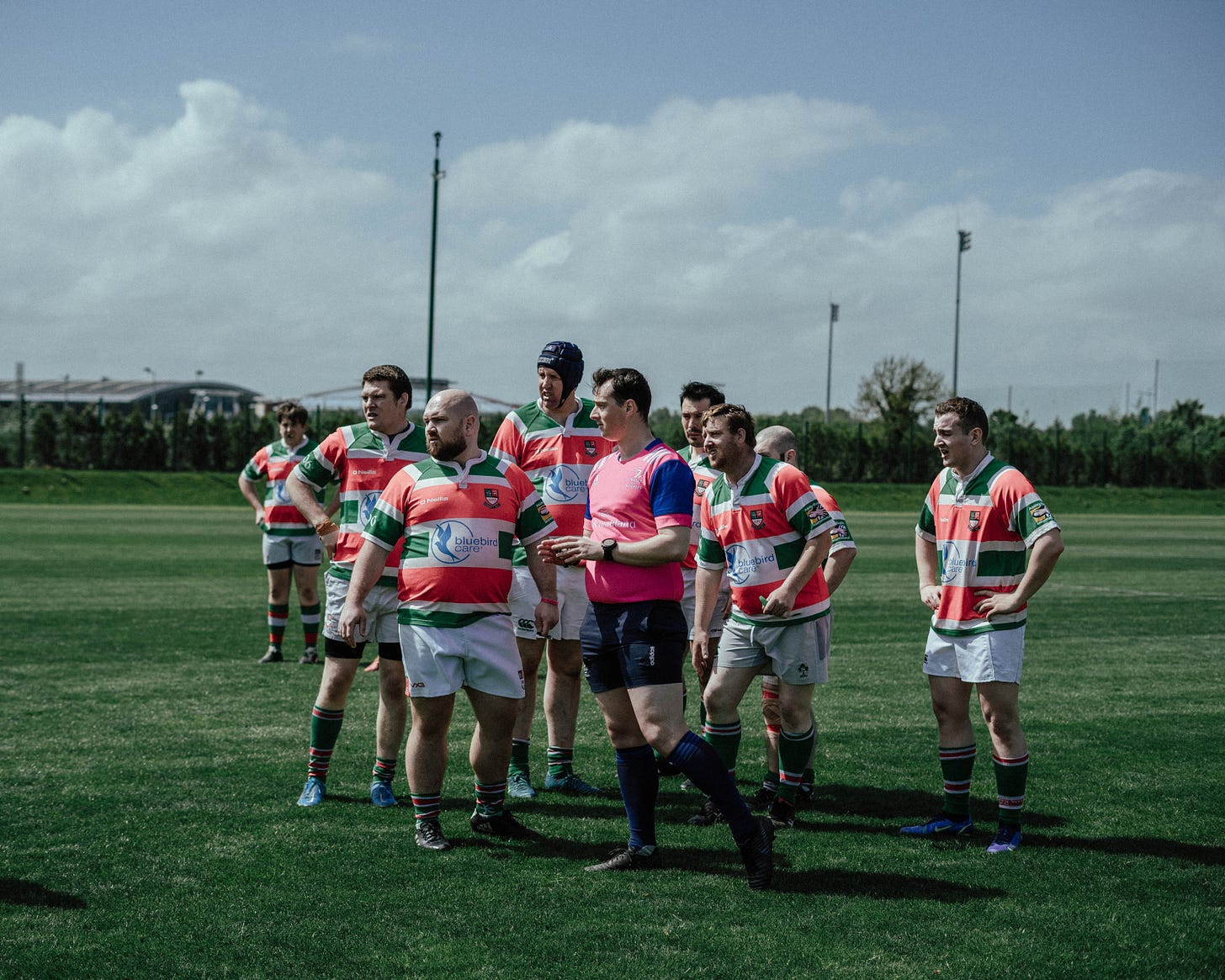
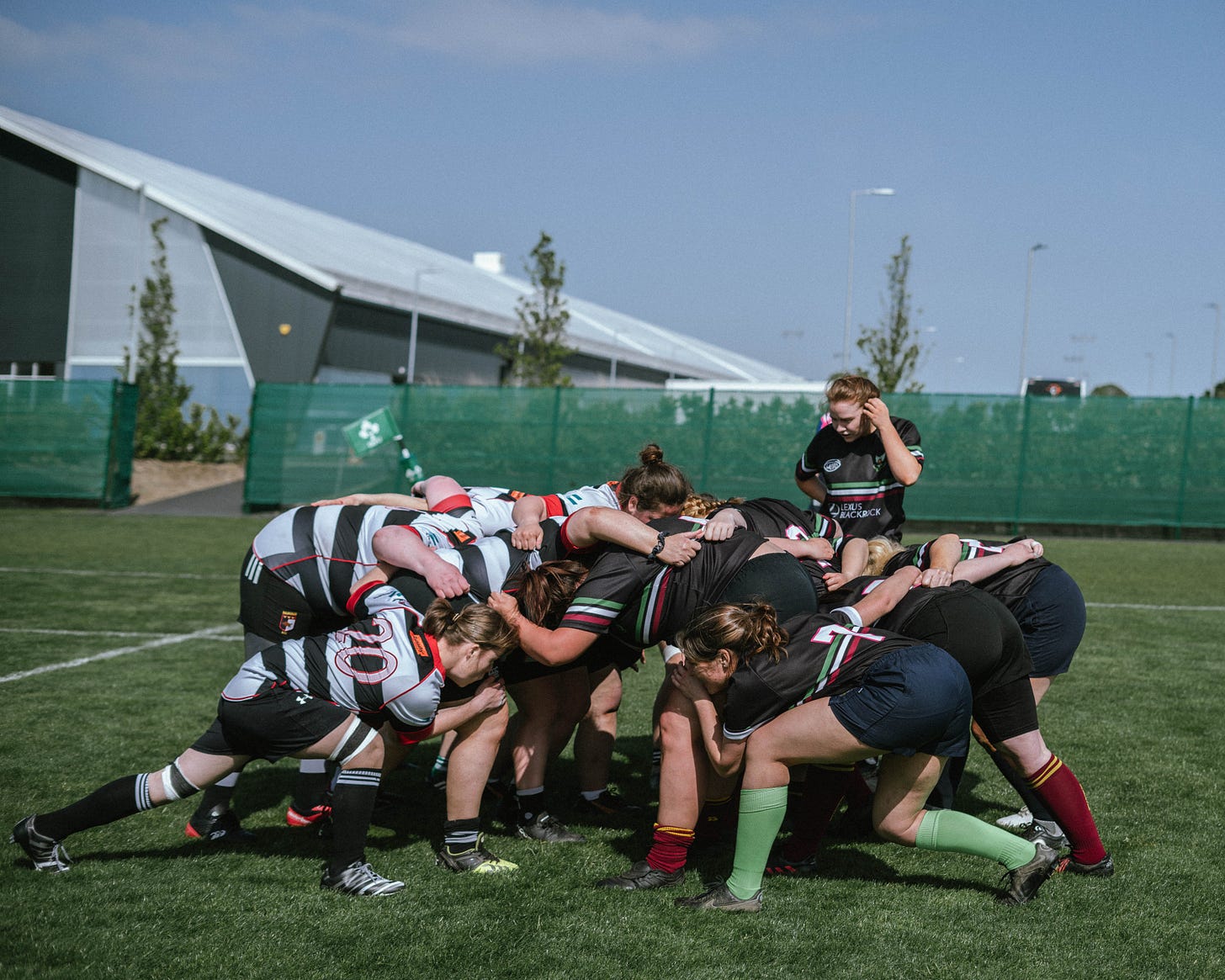



Share this post